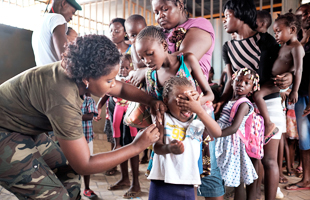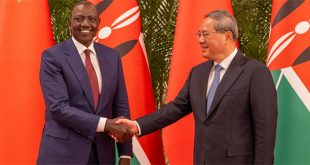
Whoever needs the vaccine currently has to choose from four health facilities all found in the city; that is KCCA clinic, the Surgery clinic in Naguru, Norvik hospital and Kizuri Entebbe airport clinic in the urban district of Entebbe. All charge a fee for the vaccines. As a result, it is alleged, some individuals have resorted to using unscrupulous means to get the yellow fever vaccination certificate without being vaccinated for travel purposes. This poses another danger of spreading the disease widely yet it has no cure. People who get the disease receive treatment just to manage symptoms as the disease has no definite drugs.
Doctors say with yellow fever, one will get mild symptoms such as fever and headache and will recover after three to four days. But after a brief reduction for hours or a day, many will develop a more severe form of the disease characterized by abdominal pains, high fever, bleeding through nose, eyes or mouth, jaundice and nausea which deteriorate into liver and kidney malfunction causing death. WHO figures show that the disease infects about 200,000 people per year of which 30,000 succumb.
Q: What is #YellowFever?
A: https://t.co/7VQcI7tzgA pic.twitter.com/PdzuHFaciw— WHO (@WHO) May 19, 2016
Yellow fever outbreak ‘serious’ but not global health emergency: WHO
AFP: A deadly yellow fever outbreak in Angola and Congo is of great concern but does not amount to a global health emergency, the World Health Organization said Thursday.
The UN health body said an emergency meeting of experts had determined that “the urban yellow fever outbreaks in Angola and the Democratic Republic of the Congo is a serious public health event which warrants intensified national action and enhanced international support.”
But the committee stopped short of declaring a so-called Public Health Emergency of International Concern, as it did during the Ebola outbreak in West Africa and the current surge in birth defects and neurological disorders linked to the spread of Zika virus in the Americas.
Yellow fever has been raging since last December in Angola, especially in the capital Luanda, killing 293 people to date and infecting another 2,267.
Cases have been imported to Kinshasa in DR Congo, and there is some evidence the disease has been spreading locally in that city.
“Urban yellow fever is a particularly dangerous and concerning situation, because of both the potential for explosive spread in urban settings with high mortality and also the risk of international spread,” Bruce Aylward, WHO chief on outbreaks and health emergencies, told reporters.
Cases have also been imported to Kenya, and the Angola outbreak has been proven to be the source of 11 infections in China.
Earlier on Thursday, the International Federation of Red Cross and Red Crescent Societies (IFRC) warned that limited vaccine supplies, inadequate disease surveillance systems, poor sanitation and continuous movement across Angola’s borders “could turn a national outbreak into a global crisis”.
Full statement from the first meeting of the IHR Emergency Committee on #YellowFever https://t.co/deVbxKHAfE (19 May 2016)
— WHO (@WHO) May 19, 2016
Vaccinate all travellers
Professor Oyewale Tomori, who chaired the WHO emergency meeting, said the committee agreed the outbreak could potentially evolve into a global crisis and had called for intensified surveillance in the affected countries and at-risk nations and mass vaccination.
WHO also reiterated its call for the vaccination of all travellers, and especially migrant workers to and from Angola and DR Congo to keep the outbreak from spreading internationally.
There is no specific treatment for yellow fever, a viral haemorrhagic disease transmitted in urban settings mainly by the Aedes aegypti mosquito, which also spreads Zika, dengue and chikungunya.
The percentage of people immunised against yellow fever remains low in many parts of Africa, even though the vaccine is nearly 100 percent effective and relatively cheap.
WHO has sent 11.7 million doses to Angola and there are plans to vaccinate 2.2 million people in DR Congo.
Aylward explained that one reason WHO had convened its emergency committee was over concern that a global stockpile of the vaccine might run dry if another urban area was affected.
But he said the experts had determined there were currently about five million doses in the stockpile, which should swell to seven million by the end of May and 17 million by August.
This, he said, “should be sufficient … to stop the transmission that we currently know.”
 The Independent Uganda: You get the Truth we Pay the Price
The Independent Uganda: You get the Truth we Pay the Price




Where and when can i get free immunization of yellow fever in uganda?
Thanks for creating this platform
i would like to know where i can get a free yellow fever vaccination
Yeah that is good how can I access for it now
Where do I go if I want to get a yellow fever vaccine.